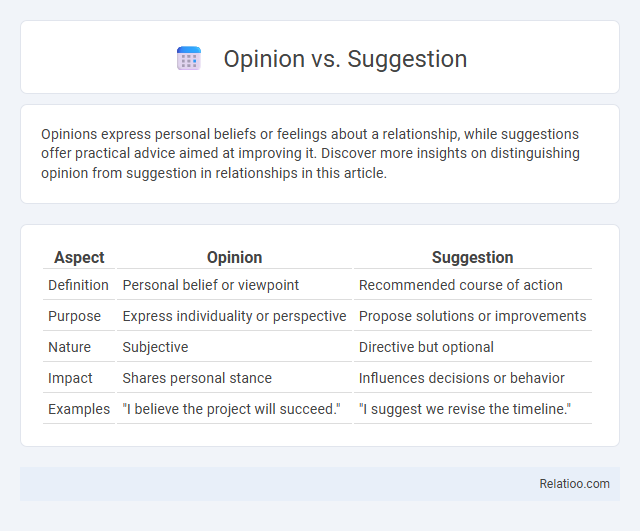Opinions express personal beliefs or feelings about a relationship, while suggestions offer practical advice aimed at improving it. Discover more insights on distinguishing opinion from suggestion in relationships in this article.
Table of Comparison
| Aspect | Opinion | Suggestion |
|---|---|---|
| Definition | Personal belief or viewpoint | Recommended course of action |
| Purpose | Express individuality or perspective | Propose solutions or improvements |
| Nature | Subjective | Directive but optional |
| Impact | Shares personal stance | Influences decisions or behavior |
| Examples | "I believe the project will succeed." | "I suggest we revise the timeline." |
Defining Opinion and Suggestion
An opinion is a personal belief or judgment that reflects Your individual perspective, often based on feelings or interpretations rather than objective facts. A suggestion offers practical advice or recommendations aimed at guiding actions or decisions to achieve a specific outcome. Understanding the difference between opinion and suggestion helps clarify whether information is subjective expression or solution-oriented guidance.
Key Differences Between Opinion and Suggestion
An opinion reflects a personal belief or judgment formed without the necessity of evidence, often subjective and based on individual feelings or experiences. A suggestion offers a recommendation or advice aimed at influencing decision-making or encouraging specific actions, typically more objective and intended to assist others. The key difference lies in opinions expressing personal viewpoints, whereas suggestions provide actionable guidance to improve or change a situation.
The Role of Opinion in Communication
Opinion serves as a subjective expression of personal beliefs or feelings, shaping the tone and direction of communication by influencing listeners' perceptions and emotional responses. It provides insight into an individual's mindset, often guiding decision-making and fostering engagement within conversations. Unlike suggestions or advice, an opinion reflects internal viewpoints rather than actionable recommendations, playing a crucial role in dialogue by adding depth and perspective.
How Suggestions Influence Decision-Making
Suggestions play a crucial role in decision-making by providing actionable recommendations based on analysis or experience, which help individuals evaluate options more effectively. Unlike opinions, which reflect personal beliefs or feelings, suggestions offer practical guidance that can steer choices toward desired outcomes. The influence of suggestions lies in their ability to frame decision contexts, reduce uncertainty, and enhance confidence by presenting feasible alternatives aligned with specific goals.
Expressing Opinions Effectively
Expressing opinions effectively involves clearly stating personal beliefs or judgments based on individual perspectives, while suggestions focus on recommending actions or ideas for consideration. Opinions often use subjective language such as "I think" or "In my view," emphasizing personal stance, whereas suggestions are framed with phrases like "You might want to" or "It could be helpful to," aiming to guide or influence decisions. Distinguishing between the two enhances communication clarity, fosters constructive dialogue, and respects differing viewpoints.
Offering Constructive Suggestions
Offering constructive suggestions involves providing actionable advice aimed at improvement, whereas opinions reflect personal beliefs without necessarily guiding change. Suggestions propose specific ideas or alternatives to address an issue, emphasizing positive outcomes and practical steps. Constructive suggestions focus on clarity, relevance, and feasibility to encourage effective problem-solving and enhance decision-making processes.
When to Use Opinion vs Suggestion
An opinion expresses a personal belief or viewpoint based on individual experiences, while a suggestion offers practical advice or recommendations aimed at solving a problem or improving a situation. You should use an opinion when sharing your perspective or feelings, and a suggestion when guiding someone toward actionable steps or alternatives. Understanding this distinction helps ensure effective communication tailored to your audience's needs.
Impact on Personal and Professional Relationships
Opinions shape personal and professional relationships by influencing perceptions and fostering open dialogue, while suggestions provide actionable advice that can enhance collaboration and trust. Unlike commands, suggestions invite consideration, promoting mutual respect and reducing conflicts in both settings. Understanding the nuanced impact of opinions and suggestions helps maintain harmony and encourages constructive feedback within teams and social circles.
Misunderstandings Between Opinion and Suggestion
Opinion represents a personal belief or judgment about a topic, often subjective and emotionally influenced, whereas suggestion is a constructive recommendation aimed at solving a problem or improving a situation. Misunderstandings arise when opinions are mistaken for suggestions, leading to confusion about whether advice is intended as guidance or simply a viewpoint. Clear communication distinguishing opinion as personal perspective and suggestion as actionable advice helps prevent misinterpretations in decision-making contexts.
Enhancing Communication with Clear Intent
Opinion expresses a personal belief or judgment that reflects individual perspectives, while suggestion offers a proposed idea intended to guide decisions or actions; recommendation provides a stronger endorsement based on expertise or evidence. Differentiating these terms enhances communication by clarifying intent, reducing misunderstandings, and ensuring that the receiver interprets the message accurately. Clear articulation of whether a statement is an opinion, a casual suggestion, or a formal recommendation fosters effective dialogue and informed decision-making.

Infographic: Opinion vs Suggestion
 relatioo.com
relatioo.com